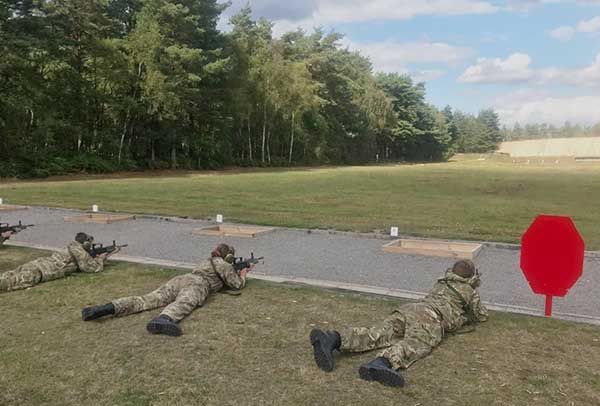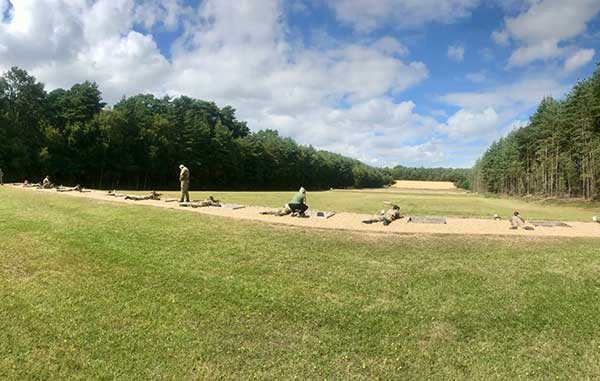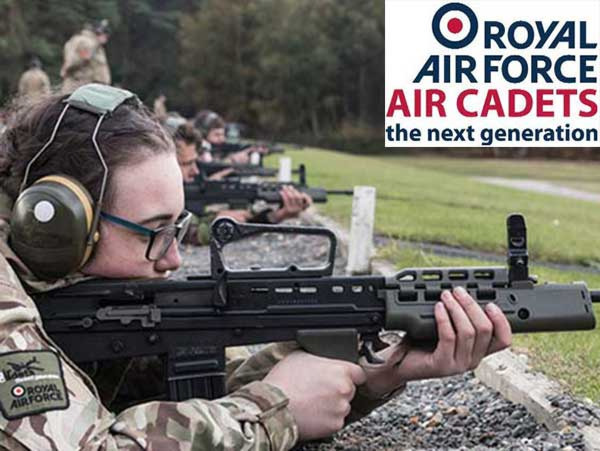RAF Air Cadets - Shooting in the Cadets
Shooting in the Air Cadets
Service shooting is split into two distinct activities; shooting as a sport/competition shooting and qualification/operational firing.
It is very difficult to try and treat them separately when you get down to the serious business of the skills required for shooting.
However as a member of the Cadet Forces, competitive shooting is what you will be doing.
Many of the shooting principles generally apply equally to both shooting as a sport and qualification/operational Firing.
The basic skills required are very much the same, but applied for a different purpose.
We need to stress that there is NOT an unrestricted supply of ammunition, and point out that it is just as much credit for you to be a marksman with an air weapon as it is with the GP Rifle, L98A2 Target Rifle or the 5.56 Rifle, in maintaining your skill as a marksman.
What is important is for everyone to make good use of what range allocations and ammunition you do have available; for as many as possible to have the chance to take part in shooting on a regular basis.
The administration to organise a range for you to shoot and to get a date allocated, means that your full support is required on the day to ensure the facilities are fully used by as many as possible.
At the time this article is being written, there are many anti-shooting organisations, whose intentions are to stop shooting make it so difficult that those who are interested will give it up. They are paying particular attention to young people who use shooting as a hobby or who are members of the cadet forces. It requires you to pay special attention to the rules and safety regulations.

Sussex Wing Air Cadets at Pirbright Ranges
Build Your Confidence
We know from our cadet experience that shooting is well controlled and supervised. You can play your part by just being a good shot and a member of your flight or squadron shooting team.
Hopefully, this article dealing with shooting will help you to:-
1. Think positively about your training and what you could do personally to improve it.
2. Give you information and ideas for you to apply in your own training.
3. Maintain a steady improvement in your results, giving you more
confidence in your ability.
4. Gain your interest in pursuit of better results making you a better team member.
5. To pass on your skills to others who may be just starting to shoot.
6. Respect the patience and interest your instructors and coaches have given to train you, and meet their expectations of you in return.
Once you start to improve - nothing will hold you back - only you can make the choice. Don’t miss a chance to have a practice shoot, no matter what type of weapon or range - PRACTICE MAKES PERFECT.
Past Experience
Should you live in a town or city it is most likely that your first experience of shooting was at a shooting gallery at a fair or in an amusement arcade. If you were very lucky you might have walked away with a useless prize, such as a plastic duck or a bag of marbles! Your ability to shoot accurately had very little to do with your skill. The weapons used in these places are not meant to be too accurate as they would have to give away too many prizes and as a result - not make any profit!
Shooting In The Countryside
Those of you who are fortunate enough to live in the country or who are able to ‘get out’ into our beautiful countryside, may have the opportunity to use a shotgun or rifle in the pursuit of sport. Some of you will live in parts of the country where the wildlife in large areas of the countryside is preserved and carefully looked after by gamekeepers. Many of their working days are spent with either a shotgun or rifle in their hands. The ‘prizes’ they win for their shooting could be the fox that kill some of their pheasants.
Conservation and Preservation
The shepherd on the hills and in the dales has to be a good shot with a rifle to protect his sheep from predators, such as foxes or stray dogs who are not kept under control by their owners or fancies a bit of lamb for its dinner.
The opportunity to spend time with people in the countryside whose living depends on using a gun, should not be missed. You may not like the idea of seeing some of our wildlife being shot and killed in the pursuit of sport or in the course of controlling vermin, but if you leave that aspect to one side and look at the skills required to be a good shot, and the fact that if you were a gamekeeper or shepherd and NOT a good shot, you would cause a great deal of unnecessary suffering by wounding an animal and it escaping to die a lingering death.
Duke of Edinburgh Award Scheme and Shooting
Shooting is one of the pursuits recognised for participation in the Duke of Edinburgh Award Scheme and therefore your time and effort spent in becoming a good shot can be rewarded through the scheme.
Join the Team
Some Wings/Regions are very keen on shooting and have regular annual rifle meetings at which there is a great competitive spirit, and out of these events many of their teams for Bisley are selected for special training. This is where you have the opportunity to come to the notice of your Wing/Region Shooting Officer, when you are consistent good shot, showing all the signs of being able to apply that ability, also having the right temperament, interest, application etc., to warrant further training as a member of your Squadron or School ‘Shooting Team’. You must bear in mind all that we have
said about your ability not only to consistently shoot well, but to work as a valued member of a team. Safety is very important at all times especially when carrying out Skill at Arms Training, but firing live ammunition on a Rifle Range gives SAFETY a more immediate importance. There are strict Range Safety Rules that will be read to you every time you go on the Range.
Types of Shooting Activity
When you consider the shooting we do within the Cadet Forces it takes on a different meaning to that of the Armed Services.
The reason does not need explaining other than the role of the services and their needs in terms of Skill at Arms using small calibre weapons are more complicated than ours, and of course serve a totally different purpose. You must also remember that a soldiers pay and promotion prospects are linked to their skills, efficiency and fitness.
As already mentioned within the Armed Services there are essentially two distinct “Shooting Activities” which can be split into Competition Shooting and Qualification/Operational Firing. It is very difficult to try and treat them separately when you get into the serious business of shooting.
The reason is that many of the shooting principles generally apply equally to both Competition Shooting and Qualification/Operational Firing, because of this you may sometimes feel that they are both mixed up together, the skills required are very much the same, but applied for a different purpose.
Competitive Shooting
Shooting in the Cadet Forces comes under the umbrella of Competitive Shooting. This not only applies to the Shooting Practices for your proficiency marksman qualifications, but also for many Wing/Region and National competitions, having a variety of conditions that make them interesting and challenging to both the individual and team competitors.
Details of these competitions are to be found from pages 98 onwards under “Competitive Shooting”.
Get your unit OC to enter a team for some of the events, you will all enjoy it, particularly if you are fit and have stamina.
Every year there is the Cadet Rifle Meeting at Bisley. Many hundreds of cadets from the UK and Commonwealth Cadet Forces take part in the various competitions. You could be one of those competitors and/or a member of your Wing/Region shooting team. It is a great experience to be there and see how keen the competitive spirit is between those taking part.
Skill at Arms and Shooting
We must also consider Skill at Arms and Shooting in relation to the current syllabus of training for the ATC and the Combined Cadet Force. You need to understand the role of Operational Firing and most certainly many of the subjects related to it Vis,. Training Tests, Fire Control Orders, Types of Fire, Section Leading, Patrols etc., but, it must be stressed that this does not actually involve Operational Firing.
Be a Marksman with Every Weapon
Like the Armed Services, the Cadet Forces do not have an unlimited supply of ammunition. You are likely to have the opportunity to spend far more time firing an Air Rifle as the ranges are more readily available and the ‘ammunition’ (pellets) not so expensive. Provided Air Rifles are properly cared for they can be very accurate, but you will still need to put in a lot of practice to become a Marksman.
There is something rather special about learning how to use a weapon safely and correctly, to take care of it and learn how to fire it producing good results. Don’t think for one moment that it’s one of those “MACHO” activities that seems to be the ‘in-thing’ to have a go at. It is a challenge to you as a Cadet to have the ability, stamina and patience to develop the required skills. In due course you may become a Marksman with one of the types of weapon you fire, if you try hard enough you should master all of them and be awarded your marksman badges.
Go Shooting Regularly
It is important for everyone to make good use of what range allocations and ammunition we have made available to us, and for as many as possible to have the chance to take part in shooting on a regularly.
It follows that when your OC has arranged a shooting practice he/she will expect you to be there, not just to shoot, but to help run the range and to encourage others to do better.

Sussex Air Cadets on the Ranges at Pirbright
Skill at Arms Training will introduce you to the weapons fired in the Cadet Force. The Skill at Arms sections in your Pocket Book will help you towards the knowledge and skills required, but there is nothing like practice to make perfect.
SHOOTING WITH THE RESERVE FORCES
Your cadet unit/school should have close liaison with the local Reserve Forces units & local military establishments and through this contact a great deal of shooting practice can be arranged.
Not that you would expect to fire ALL the weapons they use nor the practises they run, but it is another opportunity for you to practice and also makes good competition. Your contribution to time on the open ranges will no doubt be to help them by assisting in the Butts, signalling and marking up targets. You may get lucky and use an Electric Target Range (ETR), or SARTS range (Small Arms Range Targetry System) or DCCT (Dismounted Combat Trainer) when there is no marking to be done. Perhaps the greatest difference between ‘Shooting as a Sport’ and ‘Qualifying/Operational Firing’ is that a soldier has to be very fit to carry out ‘Qualifying/Operational firing’ practices, as many of them involve practices running down the range or tactical firing on ETR ranges or Close Quarter Battle Ranges (CQBR).
PRACTISE MAKE PERFECT
If you are already keen on shooting in particular, you need to work hard advantage of every opportunity to spend time firing on the range.There is always room for improvement. You must strive to improve your performance, knowing that the enjoyment will be the reward of being a good shot.
To a Recruit - a word of warning - do not be put-off if at first you don’t get a reasonable result; just remember if at first you don’t succeed -try, try again. You must stick at it, as it is necessary in shooting. Your score suffers directly by the errors you make; there is no second chance. If you make less mistakes than the others - you will win.
PERSONAL QUALITIES
It is within the ability of almost anyone to become a good shot, provided they are ‘mentally’ and ‘physically’ fit.
Mental Fitness - because it is to a great extent the ‘mental control’ that is required once you have learned the skills needed. The determination and keenness to succeed relies on Mental Fitness.
Physical Fitness in this context is the need to have those parts of the body working sufficiently well to hold, sight and fire the weapon accurately, and to reload - if it’s not a self loading weapon!
Many firers on the range find out for the first time that their eyesight is not as good as they imagined it was. Even as young as you are , have your eyesight checked at regular intervals.
On the plus side, shooting is a great sport and gives you fun and satisfaction. It does repay you for all the time and effort you have given to arrive at producing good results.
SAFE AND SKILLED
You will have been taught how to handle the weapon SAFELY and master the basic skills by your instructors.
Once you are qualified in these basic skills, then you will start to be given training in some depth by coaching you for marksmanship during live firing practices. Your ‘coach’ will modify the basic techniques to suit your individual needs.
GOING ON THE RANGE
Having arrived on the Range and moved to the area of the Firing Point in preparation for your shooting, the most important action that must be carried out are the Range Safety Drills.
These and other Range Standing Orders will be explained to you by the Range Officer, who is responsible for Range Discipline and the safety of those on or in the vicinity of the Range.
PERSONAL HEALTH/SAFETY
You are at all times responsible for your own safety, not to do anything that will constitute a danger to yourself or others. The noise of weapons being fired can damage your hearing - UNLESS YOU TAKE PRECAUTIONS by wearing some form of protection.
You must wear EAR DEFENDERS at all times when firing a weapon. Do not take part in shooting practices without them.
NOTE: check your ear defenders particularly if there are cracks in the plastic around the ear cup or if the foam sound protection is missing from within the ear cup.
PERSONNEL INSPECTION
You will be inspected - your pockets and all personal equipment, webbing etc, will be checked to make sure that no DRILL ROUNDS are brought onto the Range.
When you have finished on the range and just before you leave, you will be inspected again, this time for any live rounds of ammunition or empty cases. It is very easy to have missed a loose round in the bottom of your webbing equipment, but now is the time that you must be sure that you have none.
Should you find any, don’t try and hide them, give them to the Range
Officer or the Instructor when they inspect you as set out in your Personal Declaration.
YOUR PERSONAL DECLARATION
At the actual time of your inspection by the Range Officer or Instructor you will make a declaration (tell them) as they come to you.
These and other Range Rules apply equally to all personnel on the Range, you will see your instructors and officers inspect each other in your presence.



